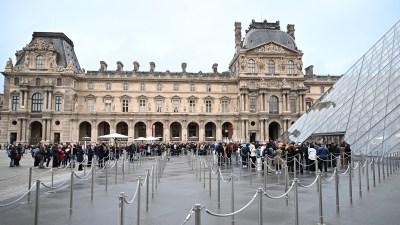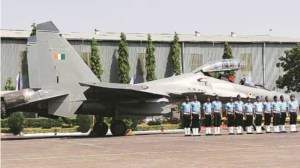Akali Dal’s two constitutions: ‘forgery’, or its right as a party for Sikhs?
Supreme Court set to hear a petition that says Akali Dal committed to following “secularism” as per EC rules, but hasn't followed through.
 Shiromani Akali Dal president Sukhbir Singh Badal and other party leaders during the 102nd anniversary celebrations of SAD at the Golden Temple Complex in Amritsar in December. (Express file photo by Rana Simranjit Singh)
Shiromani Akali Dal president Sukhbir Singh Badal and other party leaders during the 102nd anniversary celebrations of SAD at the Golden Temple Complex in Amritsar in December. (Express file photo by Rana Simranjit Singh) The dual constitution row that the Shiromani Akali Dal finds itself in has long plagued the party, which continues to have a major say in religious affairs via its control of the Sikh Gurdwara Parbandhak Committee (SGPC).
Earlier this week, the Supreme Court agreed to look into whether an offence of forgery was made out given that the party has two different versions of its constitution – one for the Election Commission and the other for the Gurdwara Election Commission. While saying that it would confine itself to the allegation of forgery, the Supreme Court has sought written submissions from five-time chief minister and Akali supremo Parkash Singh Badal, Akali Dal president Sukhbir Badal and party senior vice-president Daljit Singh Cheema.
The issue was first raised in 2009 by a Hoshiarpur-based social activist and national vice-president of the Socialist Party, Balwant Singh Khera. He accused the Akali Dal of giving a “false” undertaking to the EC saying that it had amended the party constitution to incorporate the principles of secularism and socialist.
Khera’s court petition stated: “In 1989, when an amendment was made in the Representation of the People Act, 1950, a declaration under Section 29-A of the said Act was sought from all political parties in the form of a memorandum that the rules and regulations of any such party, shall bear true faith and allegiance to the Constitution of India and to the principles of socialism, secularism and democracy and would also uphold the sovereignty, unity and integrity of India. The Shiromani Akali Dal submitted a memorandum to the EC in 1989 in which they declared that they adopt the Constitution of Shiromani Akali Dal and also declared that they shall adhere to the said provision of Section 29-A of the People Representation Act, 1950, whereas no such amendment was made in the original Constitution of the Akali Dal, which is not secular in nature.”
In November 2019, a Hoshiarpur trial court summoned Akali leaders in the case. The party moved the High Court against the summons, but the court, in August 2021, dismissed their petition. It was then that the Akali leaders approached the Supreme Court.
Denying that the Akali Dal was in the wrong, Cheema said the party would decide on its next course of action once the Supreme Court gives its order.
Senior Akali leader Gurpartap Singh Wadala said, “The Akali Dal has every right to fight elections to the SGPC, that administers religious places. The SGPC house is a democratically elected body and elections are held as per the Sikh Gurdwara Act.”
Questioning the basis of Khera’s petition, Wadala added: “In the first place, the conflict should not have arisen. We are not using religion as a tool, but only contesting elections for a representative body of the Sikhs.”
Former SGPC secretary Dalmegh Singh said that even if the Supreme Court issued an adverse judgment against the Akali Dal, it would make no difference. “The Sikh mentality cannot separate religion from politics.”
As many as 170 of the 191 members of the current SGPC house belong to the Akali Dal. The SGPC, in turn, appoints the chief of the Akal Takht, the highest temporal body of the Sikhs.
Dalmegh Singh referred to “Miri-Piri”, a concept started by the Sixth Sikh Guru, Hargobind, which advocates both temporal and spiritual authority, and argued: “The distance among Sikhs on the issue of politics and religion is as much as that between the Akal Takht and the sanctum sanctorum of the Golden Temple (implying that there is no gap).”
Singh added that there is no doubt that the Akali Dal has lost its popularity and is at one of its lowest points. “But the Sikhs and people of Punjab still want a regional party which can safeguard their and the state’s interests.”
Khera said he hoped there would be a resolution soon. “There is already much delay in the case. I am worried about the fight getting longer.”





- 01
- 02
- 03
- 04
- 05

























